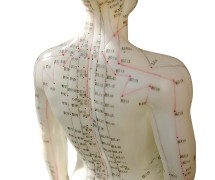Acupuncture & Meridian Balancing
Acupuncturists use a system of diagnosis to determine specific points that will help you strengthen and balance your body's energy. Through balancing the body's energy, acupuncture allows your body to heal from many health conditions.
Optimizing and balancing the flow of your body's own energy or Qi (pronounced "chee") can be done through a variety of methods: needling with or without electro-stimulation, adjusting if the meridian point is located at a joint, or through tapping, rubbing, or toning with a tuning fork. Your body's nervous system will let Dr. Kateri Porto know exactly what you will need to bring you back in balance.
What is Acupuncture?
Acupuncture is an effective form of health care that has evolved into a complete and holistic medical system. Practitioners of acupuncture and Chinese medicine have used this non-invasive medical system to diagnose and help millions of people get well and stay healthy.
An acupuncturist will place fine, sterile needles at specific acupoints on the body. This activates the body's Qi and promotes natural healing by enhancing recuperative power, immunity and physical and emotional health. It also can improve overall function and well-being. It is a safe, painless and effective way to treat a wide variety of medical problems.
What is Qi and how does it travel?
At the core of this ancient medicine is the philosophy that Qi, or vital energy, flows throughout the body. Qi helps to animate the body and protect it from illness, pain and disease. A person's health is influenced by the quality, quantity and balance of Qi.
Qi circulates through specific pathways called meridians. There are 14 main meridian pathways throughout the body. Each is connected to specific organs and glands. Meridian pathways are like rivers. Where a river flows, it transports life-giving water that nourishes the land, plants and people. In the same way, meridian pathways transport life-giving Qi to nourish and energize every cell, organ, gland, tissue and muscle.
When Qi flows freely though-out the body, one enjoys good physical, mental and emotional well-being. An obstruction of Qi anywhere in the body is like a dam, backing up the flow in one area and restricting it in others. This blockage can hinder the distribution of the nourishment that the body requires to function optimally.
What can affect Qi?
Many things influence the quality, quantity and balance of Qi. Physical and emotional trauma, stress, lack of exercise, overexertion, seasonal changes, diet, accidents or excessive activity can lead to a blockage or imbalance of Qi. Normally, when this imbalance occurs, the body naturally bounces back, returning to a balanced state of health and well-being. When the disruption to Qi is prolonged or excessive, or if the body is in a weakened state, then illness, pain or disease can set in.
What is different about an acupuncture examination?
During your physical initial exam, where a full health history is taken. Questions will be asked regarding symptoms, health, lifestyle, and any strange rare or peculiar body sensations or cravings. Dr. Kateri Porto will also check your pulses and she may examine your tongue. This information is then organized to create a complete, accurate and comprehensive diagnosis of where Qi has become blocked or imbalanced. After the interview process, you may receive an acupuncture treatment.
Why do acupuncturists check pulses?
There are 12 pulse positions on each wrist. Each position corresponds to a specific meridian and organ paring. The qualities of the pulses reflects your overall health and if there is an imbalance or problem, it may appear in the pulse.
Why do acupuncturists look at my tongue?
The tongue is a map of the body. It reflects the general health of the organs and meridians. Dr. Kateri Porto will look at the color, shape, cracks and coating on your tongue.
What should I expect during acupuncture treatment?
Where the acupuncture needle has been inserted, you may experience a vague numbness, heaviness, tingling or dull ache. Sometimes people experience a sensation of energy spreading and moving around the needle. This is called "de Qi", or the "Qi sensation". All these reactions are good and a sign that the treatment is working. After treatment, you may feel energized or may experience a deep sense of relaxation and well-being.
Do the needles hurt, and how deep do they go?
The sensation caused by an acupuncture needle varies. Some people feel a little pain as the needles are inserted, but most people feel no pain at all. The needles are tiny, just a little larger tan a cat's whisker or human hair.
The depth of insertion varies. For example, your acupuncturist will use a needling technique that is different in fleshier area, such as your buttocks.
How safe is acupuncture?
Acupuncture is extremely safe. It is an all-natural, drug-free therapy, yielding no side effects except feelings of relaxation and well-being. There is a little danger of infection from acupuncture needles because they are sterile, use once, and then discarded.
Is acupuncture safe for children?
Yes! In some instances children actually respond more quickly than adults. If your child has an aversion to needles, the doctors may massage, tap, tone with an instrument, or IR laser the acupuncture points.

Needle-free acupuncture is always available! It's called acupressure or acu-tapping.
Acupuncture is a modality of Traditional Chinese Medicine that dates back over 3 000 years. Treatments utilize your body's own energy, to heal itself. There are specific points on the body that relate to organ systems and its path of energy flow called a "meridian".